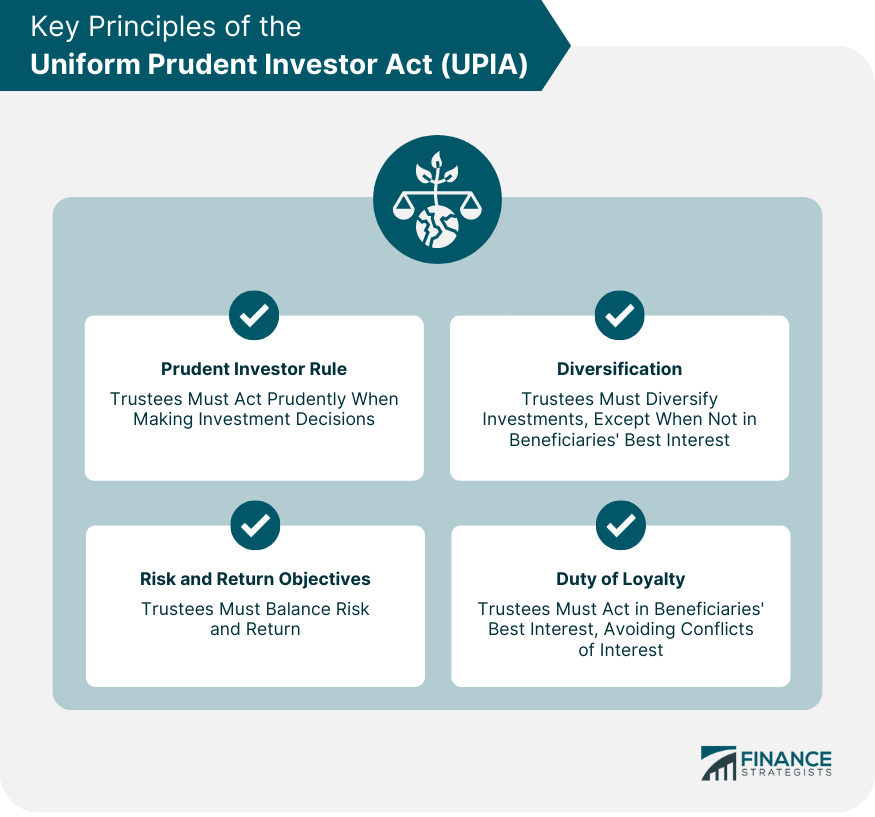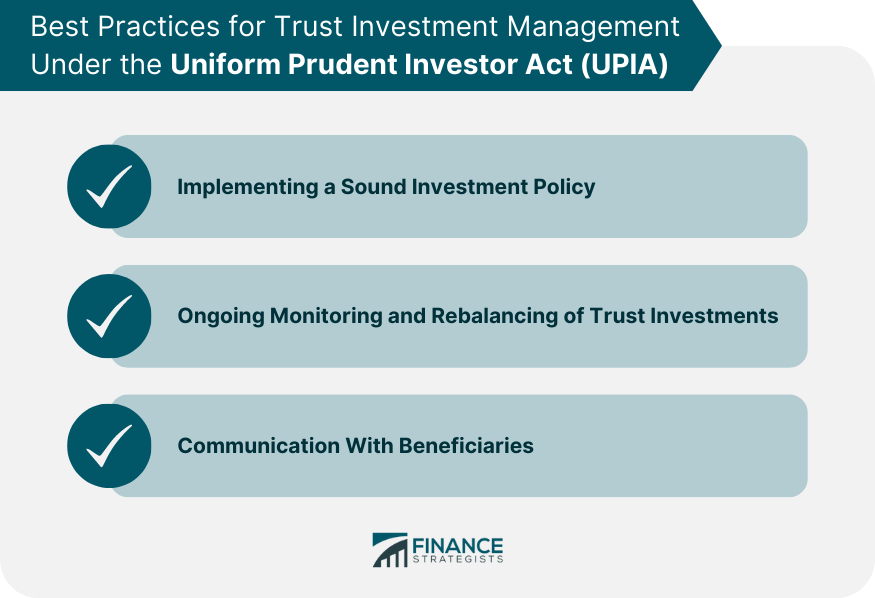The Uniform Prudent Investor Act is a legal framework that establishes guidelines for trustees managing trust investments. Adopted by many states in the United States, the UPIA is based on modern portfolio theory and emphasizes the importance of diversification and risk management. The UPIA was created to provide a uniform standard for trust investment management across states and to replace outdated investment rules that did not adequately address the complexities of modern investment practices. The Act aims to protect beneficiaries' interests by ensuring that trustees manage trust assets prudently and in accordance with the trust's objectives. The UPIA requires trustees to act as a prudent investor would, considering the purposes, terms, distribution requirements, and other circumstances of the trust. This means that trustees must exercise reasonable care, skill, and caution when making investment decisions. Under the UPIA, trustees have a duty to diversify trust investments, unless it is in the best interest of the beneficiaries not to do so. Diversification helps to spread risk across a variety of investments, reducing the potential for significant losses. The UPIA emphasizes the importance of balancing risk and return in trust investments. Trustees must consider the risk of loss, as well as the potential for income and capital appreciation when making investment decisions. Trustees have a fiduciary duty to act in the best interest of the trust beneficiaries. This duty of loyalty requires trustees to avoid conflicts of interest and to put the interests of the beneficiaries above their own. The UPIA requires trustees to consider the costs and expenses associated with trust investments, including management fees, transaction costs, and taxes. Trustees must ensure that these costs are reasonable in relation to the trust's overall investment strategy. Under the UPIA, trustees are responsible for developing and implementing a sound investment strategy that takes into account the trust's objectives, risk tolerance, and time horizon. Trustees must also monitor and review trust investments regularly to ensure that they continue to meet the trust's needs. UPIA emphasizes the importance of balancing risk and return in trust investments. Trustees must carefully consider the potential for both income and capital appreciation, as well as the risk of loss, when selecting investments for the trust. The UPIA allows trustees to delegate investment and management functions to qualified professionals, provided they exercise prudence in selecting, monitoring, and overseeing these agents. The UPIA is heavily influenced by modern portfolio theory, which emphasizes the importance of diversification and risk management in investment decision-making. By adopting the principles of modern portfolio theory, the UPIA aims to provide a more robust and effective framework for trust investment management. The incorporation of modern portfolio theory into the UPIA has led to a shift in trust investment strategies, with a greater emphasis on diversification and risk management. Trustees must now consider a broader range of investment options and adopt a more holistic approach to managing trust assets. Most states in the United States have adopted the UPIA, although some states have made modifications or amendments to the Act to suit their specific legal environments. It is essential for trustees to familiarize themselves with the UPIA rules and regulations in their state to ensure compliance. While the UPIA provides a uniform standard for trust investment management, some states have made changes to the Act to address specific concerns or to align the UPIA with their existing trust laws. Trustees should be aware of any variations or amendments to the UPIA in their state and adjust their investment strategies accordingly. Litigation involving trust investments may arise if beneficiaries believe that trustees have failed to fulfill their fiduciary duties under the UPIA. Common grounds for litigation include allegations of imprudent investment decisions, failure to diversify, and breaches of the duty of loyalty. If a court finds that a trustee has breached their fiduciary duties under the UPIA, the trustee may be held liable for any losses incurred by the trust as a result of their actions. Remedies may include monetary damages, removal of the trustee, or other actions deemed appropriate by the court. To comply with the UPIA, trustees should develop and implement a written investment policy that outlines the trust's objectives, risk tolerance, and investment strategies. This policy should be reviewed and updated regularly to ensure it remains in line with the trust's needs and circumstances. Trustees must monitor and review trust investments regularly to ensure that they continue to meet the trust's objectives and comply with the UPIA. This may involve rebalancing the trust's investment portfolio to maintain an appropriate level of risk and return. Open and transparent communication with trust beneficiaries is essential to building trust and avoiding potential conflicts. Trustees should keep beneficiaries informed of the trust's investment performance, any changes to the investment strategy, and any significant investment decisions. The Uniform Prudent Investor Act is a legal framework that establishes guidelines for trustees managing trust investments. Based on modern portfolio theory, the UPIA emphasizes the importance of diversification, risk management, and fiduciary duties. Trustees must adhere to the UPIA principles to ensure they are acting in the best interests of trust beneficiaries and to minimize the risk of litigation. Understanding and complying with the UPIA is essential for effective trust investment management. By following the principles outlined in the UPIA, trustees can make prudent investment decisions that protect the interests of trust beneficiaries and help achieve the trust's financial goals. To ensure compliance with the UPIA, trustees should develop a sound investment policy, regularly monitor and review trust investments, and maintain open communication with beneficiaries. By following these best practices, trustees can effectively manage trust investments in accordance with the UPIA and fulfill their fiduciary duties.What Is the Uniform Prudent Investor Act (UPIA)?
Key Principles of the Uniform Prudent Investor Act
Prudent Investor Rule
Diversification
Risk and Return Objectives
Duty of Loyalty
Costs and Expenses

Application of UPIA to Trust Management
Trustee's Responsibilities Under the UPIA
Balancing Risk and Return in Trust Investments
Delegation of Investment and Management Functions
UPIA and Modern Portfolio Theory
Influence of Modern Portfolio Theory on UPIA
Impact on Trust Investment Strategies
UPIA and the Legal Environment
State Adoption of the UPIA
Variations and Amendments to the UPIA
UPIA and Trust Litigation
Common Grounds for Litigation Under the UPIA
Remedies and Liability of Trustees
Best Practices for Trust Investment Management Under the UPIA
Implementing a Sound Investment Policy
Ongoing Monitoring and Rebalancing of Trust Investments
Communication With Beneficiaries

Conclusion
Uniform Prudent Investor Act (UPIA) FAQs
The Uniform Prudent Investor Act (UPIA) is a law that governs how trustees, including individual trustees and institutional trustees such as banks and trust companies, invest trust assets. The law requires trustees to manage trust assets as a prudent investor would, taking into account the purposes, terms, distribution requirements, and other relevant circumstances of the trust.
Managing trust assets as a prudent investor means that the trustee must exercise reasonable care, skill, and caution when investing and managing trust assets. This includes considering the risk and return objectives of the trust, diversifying the assets, and monitoring the investments regularly to ensure they are meeting the trust's goals.
If a trustee fails to follow the UPIA, they may be held liable for any losses or damages incurred by the trust. This can include being removed as trustee, being required to repay any losses caused by their actions, and being subject to legal action.
The UPIA applies to all trusts that are subject to state law, including revocable trusts, irrevocable trusts, and charitable trusts. However, the specific requirements and limitations of the UPIA may vary depending on the type of trust and the state in which it is governed.
The UPIA places a fiduciary duty on trustees to act in the best interests of the beneficiaries of the trust. This means that the trustee must balance the interests of current and future beneficiaries, and cannot favor one over the other. If the trustee fails to meet this duty, they may be subject to legal action by the beneficiaries.
True Tamplin is a published author, public speaker, CEO of UpDigital, and founder of Finance Strategists.
True is a Certified Educator in Personal Finance (CEPF®), author of The Handy Financial Ratios Guide, a member of the Society for Advancing Business Editing and Writing, contributes to his financial education site, Finance Strategists, and has spoken to various financial communities such as the CFA Institute, as well as university students like his Alma mater, Biola University, where he received a bachelor of science in business and data analytics.
To learn more about True, visit his personal website or view his author profiles on Amazon, Nasdaq and Forbes.















